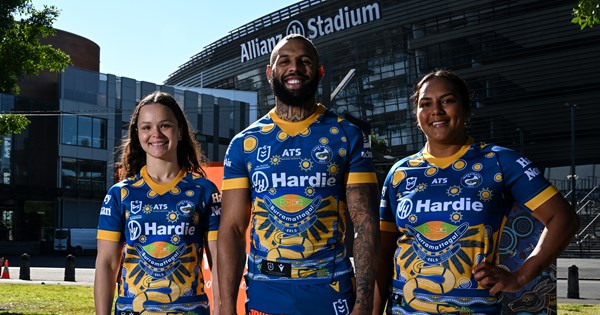Parramatta Eels star Mahalia Murphy has revealed the unique role rugby league plays in helping Indigenous children emerge from challenging family situations.
The proud Kamilaroi woman juggles life as an elite footballer with a full-time job as an Aboriginal Consultant in Child Protection Services.
The dual roles provide Murphy with a window into the struggles First Nations families face and an opportunity to achieve societal change.
It’s a responsibility the Eels skipper takes seriously and she’s determined to make a positive impact on Indigenous communities.
599″, “>809”, “>959″]”
data-eqio-prefix=”video-post-screen”
ref=”root”
>
Up Next
/
Replay
Play Next
From Artie to GI to Latrell: Widders’ part in Indigenous legacy
“Growing up as an Aboriginal girl I didn’t have the support from a community point of view,” Murphy said ahead of the NRL’s Indigenous Round. “I didn’t have anyone in community that helped me and my family along the way.
“My mum moved from Walgett to Sydney to give us kids the opportunity to thrive down here but we always had to go home to feel connected to our people.
“In child protection due to the history of the Stolen Generation and the impacts that’s had on Aboriginal people, for families to have someone they can trust and that can guide the case workers how to best work with families, gives them the best support that they need.”
Murphy will lead the Eels out for the final game of the opening weekend of Indigenous Round, with Parramatta to host North Queensland on Sunday.
The teams will face off in an NRL-NRLW double-header, with the men to play at 4.05pm before the women face off at 6.15pm.
Murphy transitioned into her current role in child protection after hearing stories of families struggling to navigate a system steeped in historical trauma.
The scars of the Stolen Generation remain raw for Indigenous communities, with many Aboriginal and Torres Strait Islander peoples cautious when interacting with case workers.
Murphy is proud to support families by providing culturally-appropriate advice to ensure children have opportunities to succeed in life.
“I used to work in community and I’d have kids and parents come and vent about what’s going on and I wanted to help more,” Murphy said. “I decided I needed to get into the space where I can actually work in homes, I can talk to schools, I can talk to the services that are involved with families.
“It’s a challenging space for families to step into because it’s not easy for an Aboriginal person to work with child protection due to the history of the Stolen Generation and the impact that’s had.
“No family wants to be told how to parent and for Aboriginal families with the trauma that’s come from history, having an Aboriginal consultant and Aboriginal caseworkers in that space helps build that rapport and gets them the best support they need.”
599″, “>809”, “>959″]”
data-eqio-prefix=”video-post-screen”
ref=”root”
>
Up Next
/
Replay
Play Next
Mahalia Murphy Try
Murphy has witnessed significant societal change throughout more than a decade in elite sport.
The Eels skipper made her Jillaroos debut in 2015, long before the NRLW was established.
Murphy returned to the Australian team nine years later for the 2024 Pacific Championships campaign, with the veteran eager to be a part of the Jillaroos 30th-anniversary celebrations this season.
599″, “>809”, “>959″]”
data-eqio-prefix=”video-post-screen”
ref=”root”
>
Up Next
/
Replay
Play Next
Mahalia Murphy’s hat-trick on debut for the Jillaroos
This season marks 10 years since the inaugural NRL Indigenous Round was held in 2015 and Murphy said it’s important to ensure the game continues expand First Nations programs in the future.
“Visibility and representation is the biggest influence on communities,” Murphy said. “Having people like Olivia Kernick, Taneka Todhunter, Josh Addo-Carr and all these Indigenous players here, that’s giving these little kids hope.
“It’s showing that it doesn’t matter where you come from or who you have around you. It’s about taking those opportunities and getting yourself opportunities along the way.
“The NRL has done a massive job with Indigenous Round and it’s far beyond just the game. It’s around helping wider Australia be educated around Indigenous people and the history of Aboriginal and Torres Strait Islander people. It’s definitely going in the right direction and the NRL’s commitment has helped a lot.”

